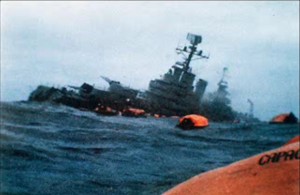‘I have perused the papers respecting the Falklands Islands. It is not at all clear to me that we have ever possessed the sovereignty of these islands.’ The Duke of Wellington 1829 (Gavshon & Rice, The Sinking of the Belgrano, p.4)
There is a certain futility in interposing the lean and ascetic visage of the law in a situation which, first to last, is merely a question of power.’ J Goebel The struggle of the Falkland Islands 1927 (1982,YUP).
IN 1832 there began the British occupation of the Falkland islands, and in 1833 Stanley Onslow hoisted the Union Jack. ‘From that time onwards, Argentina has never ceased to dispute British possession.’ (RA, p. 5) The 150th anniversary of that event precipitated the invasion. A UN Resolution of 1965 passed unanimously called for a peaceful resolution to be found, ‘bearing in mind the interests of the people of the islands and UN Resolution 1514, 1960 which sought an end to colonialism’ (Resolution 2065, RA, p.6)
Malcolm Harper, Director of the United Nations Association, told the Belgrano Enquiry how Government documents explaining the sovereignty issue had, in April 1982, mysteriously become unavailable:
‘Since 2nd April 1982 the British Government has apparently been in no doubt whatsoever that British claims to sovereignty are absolute and cannot be challenged. So confident are they that in so far as I am aware, the papers relating to that issue, which were removed from public accessibility, and please correct me if I’m wrong, but when I last made enquiries they were not yet available for the public to look at.’ (p.13)
The question mattered because, quoting Harper again,
‘..the UK had to argue its unimpeachable sovereignty over the islands in order to be able to justify its use of force within the terms of Article 51 of the UN Charter. (p.15)
Explained Michael Harbottle to the Enquiry:
‘Surely the fundamental thing about Article 51 is that self-defence action is in conjunction with other actions by the Security Council. And I would have thought that, by using Article 51 as an excuse, H.M. Government was virtually reading the first sentence and wasn’t reading the whole of the Article.’ He added, ‘Until April 1982, something like 67% [of the islanders] had the right of nationality, 33% didn’t, but suddenly they all became British, thanks to the House of Lords making amendments to the Nationality Act’. (p. 27).
For future prospects, the Assessors Report of our Enquiry quoted a Falkland islander:
There has to be a peaceful and definitive solution to the present situation which geographical fact dictates must have some connection with Argentina in the future. It is difficult in the long term to visualise a solution which does not involve the UN, perhaps in some form of trusteeship role in the larger framework of a multinational treaty.’ Ian Strange, The Falkland Islands 1983.
Also, as negotiator Al Haig wrote on 30th April 1982, following the failure of his peace initiative:
A strictly military outcome cannot endure over time. In the end there will have to be a negotiated outcome acceptable to the interested parties. Otherwise we will face unending hostility and insecurity in the South Atlantic. (RA, p.114)


For the life of me I cannot see what this page is attmepting to say. Are you saying that the islands aren’t British? If so why are you using statements pre-dating the 1833 re-assertion of sovereignty there? And what of the current situation, following a referendum that has overwhelmingly signalled the desire of the population to remain under British administration? I guess the right to self-determination means nothing to you guys if it gets in the way of an attempt to smear Margaret Thatcher?